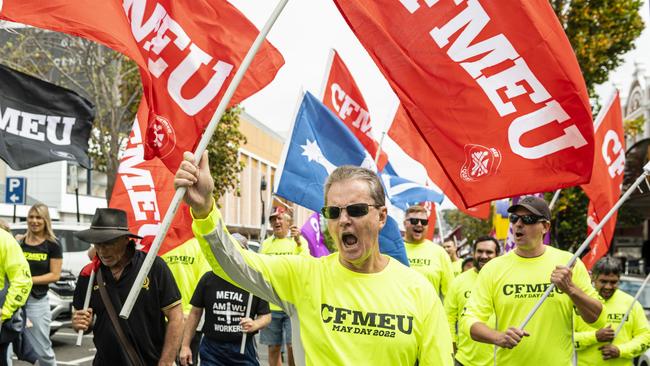
Anthony Albanese orchestrated Setka’s expulsion from the Labor Party after his crass comments against the campaigner against domestic violence were leaked three years ago. Setka subsequently harassed his own wife. Yet the Construction, Forestry, Maritime, Mining and Energy Union he serves remains affiliated to the ALP, which the union bankrolls to the tune of millions of dollars each and every election cycle. Its block votes as an affiliate of the ALP give it extra clout.
The CFMMEU is a misfit in the modern progressive Labor Party, a throwback to an earlier, masculine age of less inclusive workplaces and misogyny on an industrial scale. It inhabits a twilight zone the #MeToo movement has hardly touched, judging from the case reports published by the Australian Building and Construction Commission.
Earlier this month, for example, the CFMMEU and its SA secretary, Andrew Sutherland, were fined $227,000 for staging an intimidating and illegal protest on a construction site on East Terrace, Adelaide. Sporting hoodies and waving union flags, they chanted “grubby-grub-grub” in the face of a female lawyer and yelled at a female employee to get off site.
If there is such a thing as toxic masculinity, it is to be found in the construction industry where 51 per cent of female workers claim to have experienced harassment, according to the Australian Human Rights Commission. The ABCC’s role in policing sexist and loutish behaviour as a spin-off from the prosecution of unlawful union activity should surely be applauded by a Prime Minister who claims to be a defender of the dignity of women.
Yet the ALP plans to use its parliamentary majority to abolish the ABCC, just as the Gillard government did in 2012. Hansard records the tortured arguments of Labor MPs and senators defending the indefensible. The ABCC would trample on human rights, they said, remove fairness in the workplace and enforce the interests of big business. Another hapless group of Labor parliamentarians will be dragooned into making the threadbare arguments once parliament resumes, only this time it is going to be harder. The ABCC has demonstrated it is a force for good while the CFMMEU reputation has sunk further into the mire.
The scale of the CFMMEU’s law-breaking is astounding. Its officials have been fined more than $15m in cases the ABCC has pursued in the Federal Court since its reinstatement in 2016.
The benefit to productivity, something else Albanese claims to champion, is clear. From July 2012 to the end of 2016, almost 43,000 days a year were lost through industrial action in the sector. From the start of 2017, when the ABCC went back on the beat, to March this year, fewer than 15,000 days were lost a year.
Defunding the building police will save the CFMMEU millions a year in fines and empower its officers and members to harass, intimidate and blockade at will. In the US they call it the Minneapolis effect; a negative correlation between the amount of policing and the amount of crime in progressive-led cities that took the Black Lives Matter defund-the-police calls rather too seriously.
Labor’s indebtedness to the unions will create a serious conflict of interest in this parliament, as it did for the last Labor government. Labor’s ability to govern in the national interest is compromised by its obligations to a powerful vested interest group that represents barely 14 per cent of the workforce. For all the CFMMEU’s bluster, fewer than one in 10 construction workers are members of a union.
When Bob Hawke became prime minister in 1983 he could legitimately claim the party’s ties to the union movement reflected a natural affinity between the ALP and the workers, just over half of whom were union members. Today such a claim would be fallacious. Almost a third of union members list their occupation as manager or professional (32 per cent), according to the last ABS data. In industries with concentrations of trade union members, the biggest employer by far is the government: education and training (31 per cent), public administration and safety (28 per cent) and healthcare and social assistance (24 per cent). All have a vested interest in the growth of government.
Modern unions are cashed-up businesses that extract rich pickings from superannuation funds, building investments and other associated businesses, much of it tax-free. They are still granted this ill-deserved special status as brave advocates for the rights of working people. Labor’s affiliation with trade unions is a throwback to the party’s origins in the 19th century that looks positively awkward in the third decade of the 21st. The unions’ financial contribution to election campaigns far exceeds the miserly donations from the corporate sector to the Liberal and National parties, creating an electoral imbalance in jurisdictions where election spending is not capped.
If Labor’s proposed federal corruption commission is to have any credibility, it must be empowered to investigate the corrupting influence of the union movement on Australian politics.
It might like to investigate the correspondence between unions and politicians to discover why Labor is prepared to act against the national interest by abolishing the ABCC and those who stand to benefit from that decision.
In the meantime, perhaps the Prime Minister can furnish us with a more persuasive explanation for a measure that will allow law-breaking and disorder to flourish on construction sites. Perhaps he can convince us this is not as it seems: a prima facie case of cash for favours.
Nick Cater is executive director of the Menzies Research Centre.







John Setka’s offensive remarks about Rosie Batty were not the career-ender for which some had hoped. Instead, Setka’s star has continued to soar, as David Penberthy reported in The Australian last week. He is arguably the most powerful union official in the construction industry now the Victorian branch of the CFMMEU has added SA to its empire along with Tasmania and the NT.